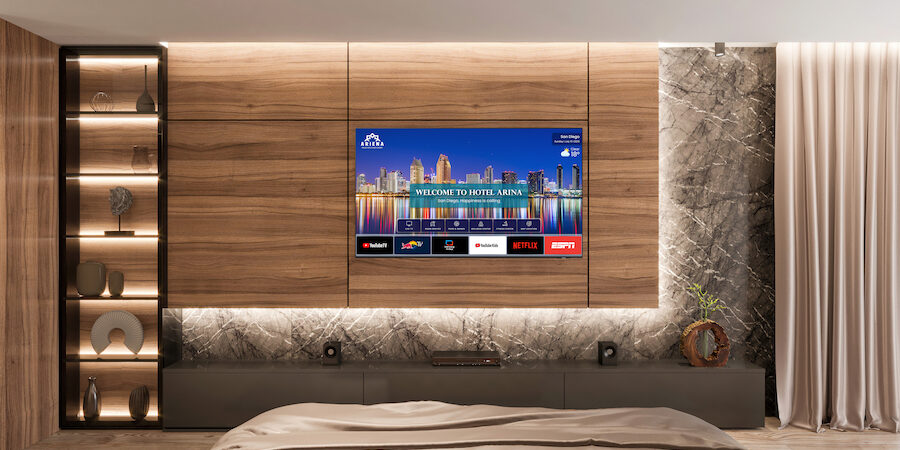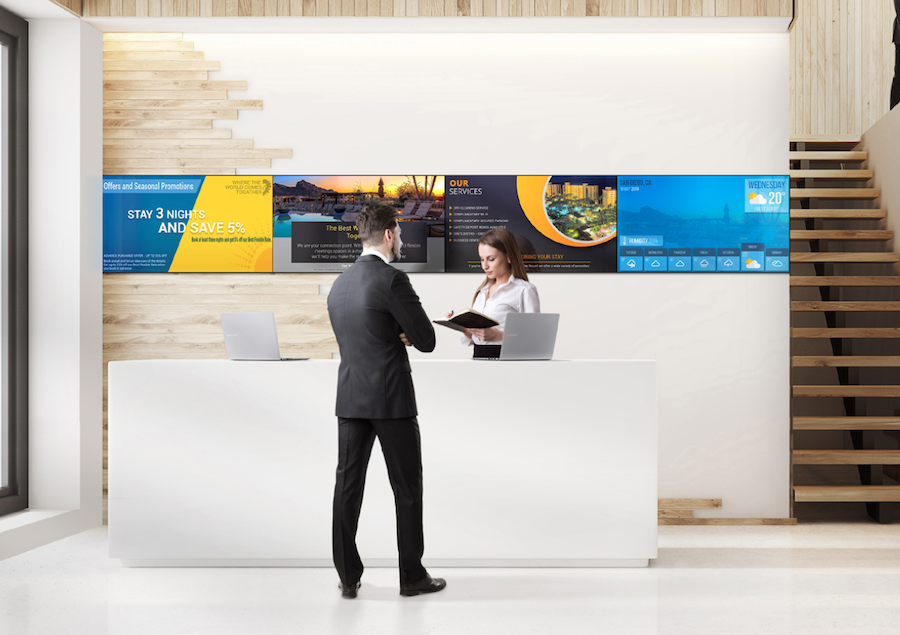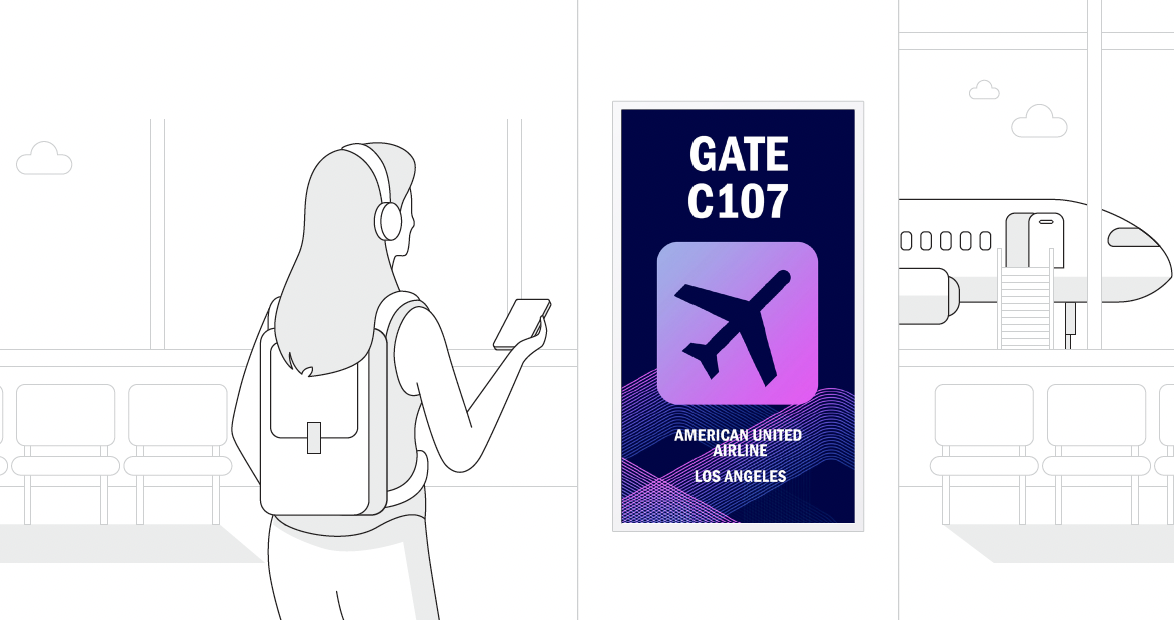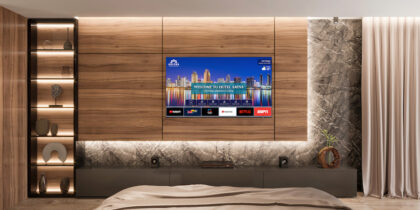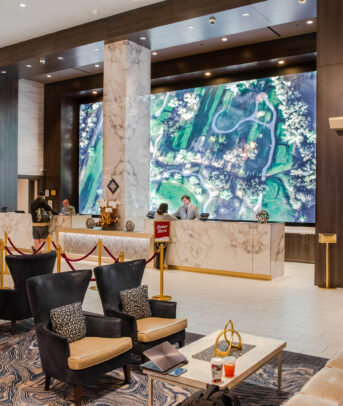In-room entertainment is a critical aspect of the hotel guest experience. Yet many travelers know the frustration of flipping through dozens of hotel room TV channels only to find nothing they want to watch.
Technological advancements and shifting consumer expectations have brought about significant changes in the hospitality TV (HTV) category. Hotels are upgrading from set-top boxes (STBs) and increasingly adopting smart TVs that offer a wide range of functionalities such as internet browsing, streaming services, and app integrations. These solutions go beyond traditional TV viewing to enhance the guest experience and streamline operations. Integrating over-the-top (OTT) apps can revolutionize how guests interact with in-room entertainment systems.
Guest satisfaction and smoother operations aren’t the only advantages — smart TVs can boost ROI and profits, too. Many guests, especially millennials and Gen Z, specifically seek out hotels with this technology. Streaming services also remove or reduce the cost of expensive cable packages and external hardware, lessening overall costs for the business.
What are OTT apps and casting?
Legacy hotel TVs face tremendous competition from guests’ personal devices, especially if they only offer basic cable channels and a few pay-per-view options. This can cost hotels a significant opportunity to engage with and market to guests while they are in the hotel. It can also create the impression that the hotel brand is out of date and behind the times. Ensuring guests have their preferred content and subscription services at their fingertips, however, projects a modern, innovative brand image.
The latest HTVs seamlessly integrate OTT apps (video content delivered over the internet through streaming technology) and casting technologies (streaming content from a guest’s personal device through the television) to provide guests with the same on-screen experience they have at home. In fact, the top models may even do it better, thanks to enhancements in screen size, picture resolution and color accuracy.
Unlike traditional TV schedules, OTT apps and casting offer on-demand content, giving guests the freedom to watch what they want, when they want. That means guests can continue enjoying their favorite shows and movies without interruption, making the hotel experience feel more like home. The ability to access familiar streaming services adds a layer of comfort and convenience that is particularly appreciated by frequent or long-term travelers.
When guests can have the same on-screen experience they do at home, this increases their sense of comfort and convenience at the hotel. After a long day of business or pleasure, they simply sign in to their favorite app via the HTV and binge their favorite series at their leisure.
Some forward-thinking hotel brands already offer comprehensive guest services — such as room service and booking spa visits and activities — through HTVs. In the future, customizable features tailored to member rewards and individual guest profiles will be commonplace. For example, a sports enthusiast might see more sports channels while families might have more kid-friendly options.
What to consider when choosing which HTV is right for your brand
When choosing an HTV for your hotel, it’s important to consider more than just screen size and price point. The hardware, software and features inside matter just as much — if not more. That’s why Samsung HTVs are so popular in many branded hotels, as the technology and performance boost the brand image.
The Samsung HCU700 Series, for example, is a cost-effective hybrid smart HTV option. It includes the free LYNK Cloud device management system via a layer of software that runs on the hotel’s operating system to better manage the device. If you’ve ever been greeted by a personalized welcome message on your hotel room TV, this is an example of a hybrid TV. In addition to top streaming apps like Netflix and YouTube TV, the HCU700 Series offers more than 500 free channels and allows the user to manage the device when connected to the hotel network.
The Samsung BU8000 Series is a smart TV that provides a premium hotel entertainment experience. Not only does the 4K UHD Crystal Display and contrast enhancer make shows and movies look and sound better than at home, but the TV offers access to top streaming services via its intuitive Smart Hub including Netflix and YouTube TV. Also, with free LYNK Cloud device management or full LYNK Cloud deployment, hotel managers can customize the home screen for a more natural integration into the room environment and to improve the guest experience.
The Samsung HQ60B Series brings quantum dot technology to the screen, creating the most vibrant colors, deepest blacks and sharpest detail. The native Netflix OTT app — along with cable, satellite, or video-on-demand services — means your guests won’t miss a minute of their favorite content.
All of these models run with the Tizen Enterprise Platform, which provides hotel managers and marketers with tools for easy deployment, zero-touch configuration and streamlined maintenance. And the LYNK Cloud integration pays even more dividends by allowing hotel managers to analyze guests’ content use and uncover marketing insights to deliver optimized promotions.
The next revolution in hospitality
Enhance the guest experience, build your brand and drive revenue with this free guide. Download Now
What are the benefits of OTTs in hotels?
Hotel guests increasingly value personalized, high-quality content, and OTT apps offer a way to meet — and exceed — those expectations.
Hotel TVs with OTT apps are a key differentiator among top brands, providing guests with the personalized, high-quality entertainment they crave. Offering OTT apps reinforces a hotel brand’s commitment to innovation and guest satisfaction while also presenting a modern, cutting-edge and on-trend brand image.
Another key factor driving the switch to smart HTVs is hotels’ desire to reduce costs, such as those for cable subscriptions and extra hardware. Many hotels have no way to decipher which programs guests are watching, so providing an expansive channel lineup is expensive and often a waste of money. Streaming services remove or reduce entertainment costs, and without the need for STBs, there are fewer failure points that require maintenance. Removing bulky boxes and cords also looks sleeker and more modern, and consumes less phantom power.
What to consider when upgrading hotel TVs
Upgrading to hospitality TVs with OTT capabilities requires careful planning and consideration. Hotels need to address several key questions and challenges.
- Cost: This is typically the top consideration, so it’s important to first determine your budget for upgrading TVs before choosing a model. You should also factor in operational costs, such as high-speed internet service. Your long-term cost calculations might include potential returns, too, if the HTV allows in-room advertising.
- Infrastructure: Supporting many streaming devices simultaneously requires a large amount of internet bandwidth. Without strong and consistent Wi-Fi, guests may experience frustration in the form of slow-loading pictures, delayed audio and other technical issues. As such, the hotel’s internet service may have to level up to handle such loads.
- Security: With guests logging into personal streaming services on screen, it’s essential to protect their data. That means incorporating robust data security that addresses guests’ privacy concerns. Management and staff also need to understand the security system to effectively answer questions about it.
Fortunately, partnering with a trusted vendor, such as Samsung — which works with the world’s biggest hotel brands — addresses all these issues to ensure a successful upgrade and improved guest experience.
Positioning your hotel as a forward-thinking leader
The integration of OTT apps on hotel TVs represents a significant way to enhance the guest experience, allowing hotels to meet current expectations for personalized, high-quality entertainment. This shift not only aligns with current trends but also positions properties as forward-thinking leaders in guest satisfaction. With careful planning and implementation, hotel managers can transform in-room entertainment with HTVs and OTT apps, making guest stays even more enjoyable and memorable while providing hotels with more ways to profit from them.
Discover more of the latest technology trends in the hospitality industry to transform your hotel. Also, get your free guide to elevating the guest experience through digital transformation.
